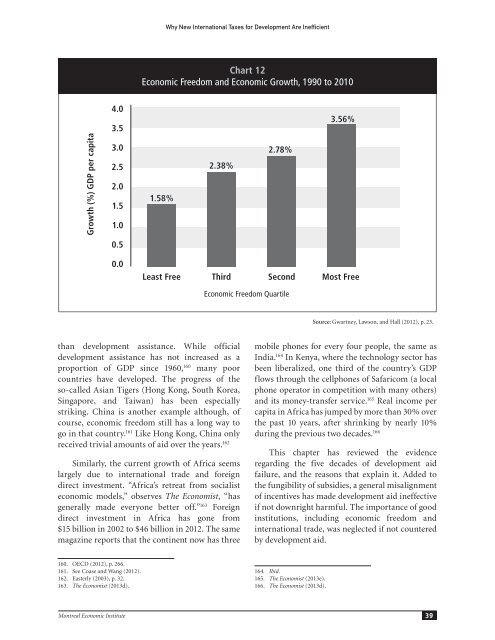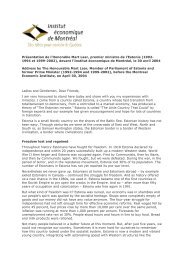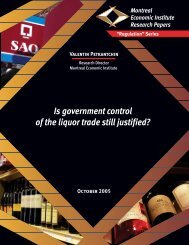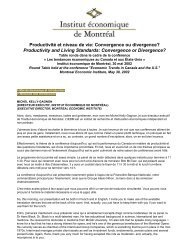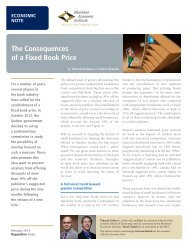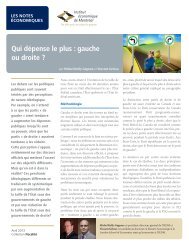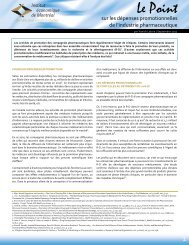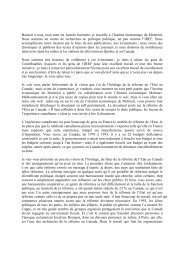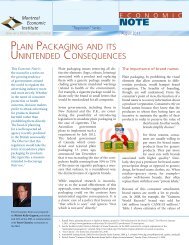Publication (PDF format) - Institut économique de Montréal
Publication (PDF format) - Institut économique de Montréal
Publication (PDF format) - Institut économique de Montréal
You also want an ePaper? Increase the reach of your titles
YUMPU automatically turns print PDFs into web optimized ePapers that Google loves.
Why New International Taxes for Development Are InefficientChart 12Economic Freedom and Economic Growth, 1990 to 20104.03.53.56%Growth (%) GDP per capita3.02.52.01.51.01.58%2.38%2.78%0.50.0Least Free Third Second Most FreeEconomic Freedom QuartileSource: Gwartney, Lawson, and Hall (2012), p. 23.than <strong>de</strong>velopment assistance. While official<strong>de</strong>velopment assistance has not increased as aproportion of GDP since 1960, 160 many poorcountries have <strong>de</strong>veloped. The progress of theso-called Asian Tigers (Hong Kong, South Korea,Singapore, and Taiwan) has been especiallystriking. China is another example although, ofcourse, economic freedom still has a long way togo in that country. 161 Like Hong Kong, China onlyreceived trivial amounts of aid over the years. 162Similarly, the current growth of Africa seemslargely due to international tra<strong>de</strong> and foreigndirect investment. “Africa’s retreat from socialisteconomic mo<strong>de</strong>ls,” observes The Economist, “hasgenerally ma<strong>de</strong> everyone better off.” 163 Foreigndirect investment in Africa has gone from$15 billion in 2002 to $46 billion in 2012. The samemagazine reports that the continent now has threemobile phones for every four people, the same asIndia. 164 In Kenya, where the technology sector hasbeen liberalized, one third of the country’s GDPflows through the cellphones of Safaricom (a localphone operator in competition with many others)and its money-transfer service. 165 Real income percapita in Africa has jumped by more than 30% overthe past 10 years, after shrinking by nearly 10%during the previous two <strong>de</strong>ca<strong>de</strong>s. 166This chapter has reviewed the evi<strong>de</strong>nceregarding the five <strong>de</strong>ca<strong>de</strong>s of <strong>de</strong>velopment aidfailure, and the reasons that explain it. Ad<strong>de</strong>d tothe fungibility of subsidies, a general misalignmentof incentives has ma<strong>de</strong> <strong>de</strong>velopment aid ineffectiveif not downright harmful. The importance of goodinstitutions, including economic freedom andinternational tra<strong>de</strong>, was neglected if not counteredby <strong>de</strong>velopment aid.160. OECD (2012), p. 266.161. See Coase and Wang (2012).162. Easterly (2003), p. 32.163. The Economist (2013d).164. Ibid.165. The Economist (2013e).166. The Economist (2013d).Montreal Economic <strong>Institut</strong>e 39


